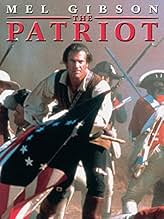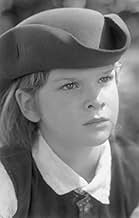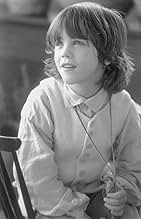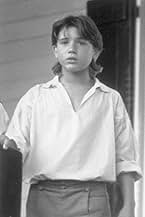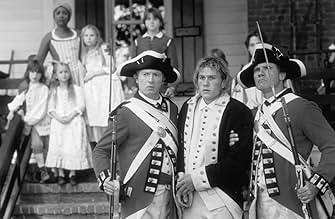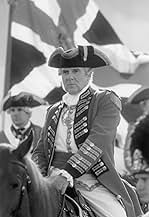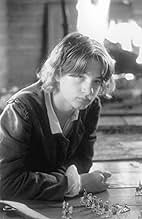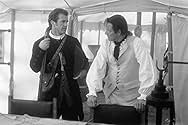Peaceful farmer Benjamin Martin is driven to lead the Colonial Militia during the American Revolution when a sadistic British officer murders his son.Peaceful farmer Benjamin Martin is driven to lead the Colonial Militia during the American Revolution when a sadistic British officer murders his son.Peaceful farmer Benjamin Martin is driven to lead the Colonial Militia during the American Revolution when a sadistic British officer murders his son.
- Nominated for 3 Oscars
- 9 wins & 23 nominations total
- Director
- Writer
- All cast & crew
- Production, box office & more at IMDbPro
Storyline
Did you know
- TriviaHeath Ledger didn't work for a year because he only got offers for teen heartthrob roles. He was about to quit acting, and return to Australia, when he was cast in the film.
- GoofsGeorge Washington's proclamation regarding the freeing of slaves who give one year of service is incorrectly interpreted. The historical offer applied to slaves who enlisted in the Continental regulars or served in regular state forces which served with Continental armies. It did not apply to units such as Benjamin Martin's local militia, which solely were under state control.
- Quotes
Colonel William Tavington: Kill me before the war is over, will you? It appears that you are not the better man.
Benjamin Martin: You're right. My sons were better men.
- Alternate versionsIn the extended edition, Benjamin Martin's youngest children get their first taste of the horrors of war prior to Thomas's death. This comes just before the evening when Gabriel stumbles home after being wounded in a nearby battle. Something (the viewer is unaware) catches the attention of the Martin children and they stride over to a nearby creek/river to investigate. What they discover are the bodies of several soldiers floating downstream. Martin then comes over and ushers the children back into the house.
- SoundtracksBoney
Traditional
Performed by Marquetta L. Goodwine and the Gullah Cunneckshun
Featured review
The Patriot is NOT a documentary. It didn't pretend to be, and wasn't. Loosely based upon Francis Marion (the "Swamp Fox"), it only touched on Marion's impact on the Revolution in South Carolina. If anything, it was downplayed. For instance, in real life, he had over 150 men in his guerrilla band. The movie portrayed him as having far fewer. As a documentary, it fails on this and many other points. As a movie, it is a tremendous success.
As far as visuals, they were stunning. The wide-open vistas and battle scenes were breath-taking and beautifully filmed. Yes, it was violent, but that lent a realism to the film that most other films about this era lack. The look and feel of this period was portrayed well.
The acting was superb. I won't give anything away, but this did NOT (arguably) have either an entirely "Hollywood" plot – people, including civilians, DIE, as they do in war – or much of a "Hollywood" ending, despite a relatively happy one. That was impressive, and made the film genuine, exciting and at times, shocking. Plot points such as Benjamin Martin's youngest daughter's feelings about her daddy, and the romance between his son and a young girl were touching, and even emotional.
I found some things complain about. Crisp, clean, brand-new Colonial American flags suddenly appear after, and during, the final battle. In reality they would have been rags by then – or at least not so clean. One bad bit of dialogue: Benjamin Martin is on the beach with his sister-in- law, and he asks if he can sit down. Her reply, "It's a free country – or will be soon," was a 20th century throw-away line dressed up with a 1780 caveat, and I cringed at it.
The film was historically accurate in many respects. The formal way of speaking, plus the family-above-all, loyalty-to-The-Cause attitudes expressed throughout, were genuine, even though both are out of favor today. Children using weapons, and going off to fight on a moment's notice, was not an uncommon story, and supposedly happened in a branch of my own family. Relationships like Martin's and his wife's sister did occur, often out of necessity. I was surprised to read afterwards that the battle tactics of the last scene occurred, almost exactly as shown, at the Battle of Cowpens, including fierce hand-to-hand combat. Colonel Banastre Tarleton – the basis for the movie's character William Tavington – was indeed seen as a war criminal by American colonists at the time, and the real Tarleton even had a horse shot out from under him!
But was it biased? Sure it was. Roughly a third of the American colonists were Loyalists, another third were "rebels", and another third were undecided. It would have made the story more complete and complex to portray this (or the time Tarleton mistakenly slaughtered some of those very Loyalists!) But I've read a poem online ("Ode to Valour") dedicated to Col. Banastre Tarleton's "heroic exploits" that would shame modern-day propagandists.
I think we all accept that not every British officer of this era was a monster. In fact, in the movie – as in real life - Cornwallis and other British officers were appalled that the "Ghost"/Swamp Fox did not play by the rules of "civilized warfare", and chastised characters like Tavington who also breached them. The real Swamp Fox knew a bit about balance, however. After after the war, when the real Francis Marion served in the South Carolina Senate, he is said to have advocated a lenient policy toward the Loyalists. The real Tarleton survived the war, went home to write his memoirs, was seen as a hero, and was elected to Parliament. Maybe we need a sequel to cover all of these other aspects of the story. Until then, this one is a must- see.
As far as visuals, they were stunning. The wide-open vistas and battle scenes were breath-taking and beautifully filmed. Yes, it was violent, but that lent a realism to the film that most other films about this era lack. The look and feel of this period was portrayed well.
The acting was superb. I won't give anything away, but this did NOT (arguably) have either an entirely "Hollywood" plot – people, including civilians, DIE, as they do in war – or much of a "Hollywood" ending, despite a relatively happy one. That was impressive, and made the film genuine, exciting and at times, shocking. Plot points such as Benjamin Martin's youngest daughter's feelings about her daddy, and the romance between his son and a young girl were touching, and even emotional.
I found some things complain about. Crisp, clean, brand-new Colonial American flags suddenly appear after, and during, the final battle. In reality they would have been rags by then – or at least not so clean. One bad bit of dialogue: Benjamin Martin is on the beach with his sister-in- law, and he asks if he can sit down. Her reply, "It's a free country – or will be soon," was a 20th century throw-away line dressed up with a 1780 caveat, and I cringed at it.
The film was historically accurate in many respects. The formal way of speaking, plus the family-above-all, loyalty-to-The-Cause attitudes expressed throughout, were genuine, even though both are out of favor today. Children using weapons, and going off to fight on a moment's notice, was not an uncommon story, and supposedly happened in a branch of my own family. Relationships like Martin's and his wife's sister did occur, often out of necessity. I was surprised to read afterwards that the battle tactics of the last scene occurred, almost exactly as shown, at the Battle of Cowpens, including fierce hand-to-hand combat. Colonel Banastre Tarleton – the basis for the movie's character William Tavington – was indeed seen as a war criminal by American colonists at the time, and the real Tarleton even had a horse shot out from under him!
But was it biased? Sure it was. Roughly a third of the American colonists were Loyalists, another third were "rebels", and another third were undecided. It would have made the story more complete and complex to portray this (or the time Tarleton mistakenly slaughtered some of those very Loyalists!) But I've read a poem online ("Ode to Valour") dedicated to Col. Banastre Tarleton's "heroic exploits" that would shame modern-day propagandists.
I think we all accept that not every British officer of this era was a monster. In fact, in the movie – as in real life - Cornwallis and other British officers were appalled that the "Ghost"/Swamp Fox did not play by the rules of "civilized warfare", and chastised characters like Tavington who also breached them. The real Swamp Fox knew a bit about balance, however. After after the war, when the real Francis Marion served in the South Carolina Senate, he is said to have advocated a lenient policy toward the Loyalists. The real Tarleton survived the war, went home to write his memoirs, was seen as a hero, and was elected to Parliament. Maybe we need a sequel to cover all of these other aspects of the story. Until then, this one is a must- see.
- Movie Steve
- Jul 25, 2000
- Permalink
Details
- Release date
- Countries of origin
- Official sites
- Languages
- Also known as
- El patriota
- Filming locations
- Rock Hill, South Carolina, USA(Revolutionary War Re-enactment battles)
- Production companies
- See more company credits at IMDbPro
Box office
- Budget
- $110,000,000 (estimated)
- Gross US & Canada
- $113,330,342
- Opening weekend US & Canada
- $22,413,710
- Jul 2, 2000
- Gross worldwide
- $215,294,342
- Runtime2 hours 45 minutes
- Color
- Sound mix
- Aspect ratio
- 2.39 : 1
Contribute to this page
Suggest an edit or add missing content




